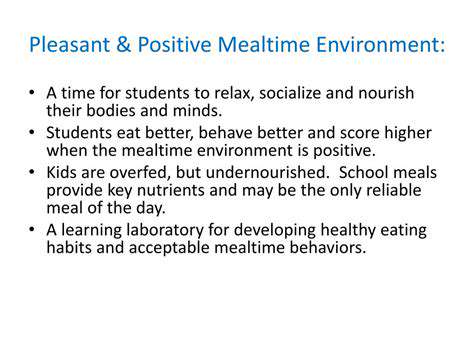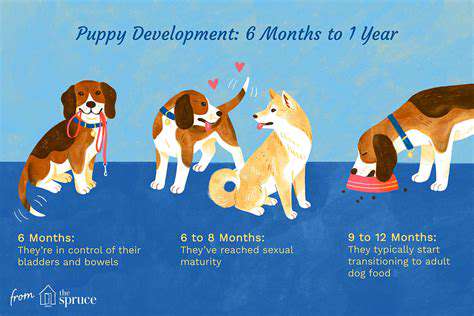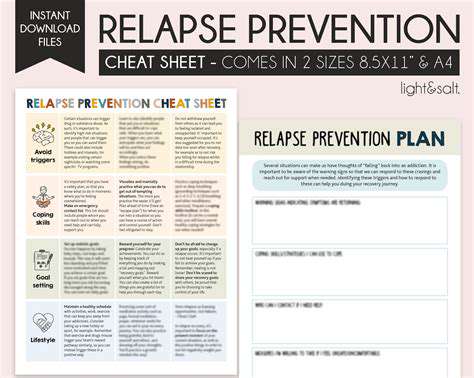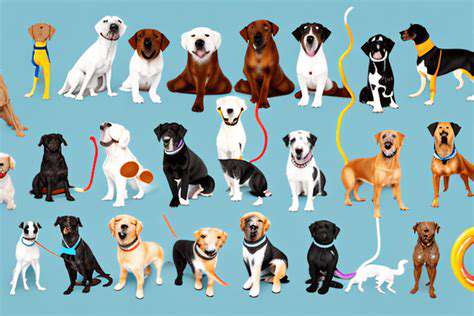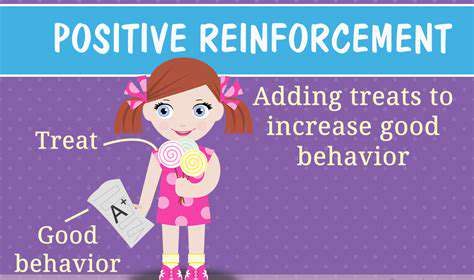Socialization: The Foundation of Happy and Trainable Dogs
Socialization is vital for a puppy's overall development and future behavior. Expose your puppy to a variety of people, animals, and sights, sounds, and smells, but always supervise them closely, especially during initial interactions. This helps them develop into well-adjusted, confident adult dogs.
Enroll your puppy in puppy classes, where they can socialize with other puppies and learn basic obedience commands. These classes are a great way to introduce your puppy to controlled social situations, and learn appropriate behavior around their peers. This is also a fantastic opportunity to connect with other puppy owners and get advice.
Basic Obedience Training: Essential for a Happy Life
Early obedience training is crucial for shaping your puppy's behavior and building a strong bond between you and your furry friend. Start with simple commands like sit, stay, and come. Use positive reinforcement techniques, such as treats and praise, to motivate your puppy and make training enjoyable.
Consistency is key in training. Use the same commands and hand signals every time to avoid confusion. This helps your puppy understand your expectations and fosters a clear understanding of what is expected of them. Positive reinforcement techniques will reward good behavior and help keep your puppy engaged in the training process.
Grooming: Keeping Your Puppy Clean and Healthy
Regular grooming is essential for your puppy's health and well-being. This includes brushing their coat to remove loose hair and prevent mats, checking their ears for any signs of infection, and trimming their nails as needed. Consistent grooming is also beneficial for bonding with your puppy. This will also help you develop a better understanding of their body language and overall health.
Introduce grooming tools and techniques gradually. Make the experience positive and rewarding. This helps your puppy become accustomed to these procedures and avoids creating negative associations.
Nutrition: Fueling Your Puppy's Growth
A balanced and nutritious diet is essential for your puppy's healthy growth and development. Choose a high-quality puppy food that meets their specific nutritional needs. Consult with your veterinarian to determine the appropriate amount and type of food for your puppy's size and breed. Avoid feeding your puppy table scraps, as these can be detrimental to their health.
Veterinary Care: A Critical Aspect of Puppy Ownership
Regular veterinary checkups are essential for ensuring your puppy's health and well-being. Schedule vaccinations and necessary parasite prevention treatments as recommended by your veterinarian. Early detection and treatment of any health issues will ensure a happy and healthy life for your furry friend. Be sure to follow all veterinarian instructions for preventative care.
Safety Precautions: Protecting Your Puppy
Puppy-proofing your home is crucial for keeping your puppy safe. Secure any potentially hazardous items, such as cleaning products, medications, and electrical cords. Keep poisonous plants out of reach, and ensure that your puppy can't access anything that could cause injury or harm. Always supervise your puppy, especially when they are exploring new environments.
Meeting Other Dogs and People
Meeting Other Dogs
Introducing your dog to other dogs is a crucial part of socialization. It's important to do this in a controlled and positive environment, ideally at a dog park or during a supervised playdate with dogs you know and trust. Start with short, supervised interactions where your dog can observe and sniff other dogs from a safe distance. Positive reinforcement, such as treats and praise, is essential for teaching your dog appropriate canine communication and body language. Never force your dog into a situation where they feel uncomfortable or threatened. Remember, a positive introduction is key to building confidence and preventing fear or aggression.
Observe your dog's body language during these interactions. Signs of stress or fear, such as tucked tails, ears back, lip licking, or yawning, indicate your dog may need more time to adjust. If your dog displays any of these cues, remove them from the situation and provide a safe space where they can calm down. It's important to create positive associations with other dogs, not negative ones.
Meeting People
Socializing your dog with people is just as vital as socializing them with other dogs. Expose your dog to a variety of people – children, adults, men, women, people of different ages and ethnicities. This exposure helps build confidence and teaches your dog how to behave appropriately around humans. Start with controlled encounters, such as having people approach your dog slowly and calmly while offering treats and positive reinforcement. Gradually increase the complexity of interactions, allowing your dog to get comfortable with different levels of interaction and activity. Ensure that the people interacting with your dog are patient and understanding, avoiding sudden movements or loud noises that may startle your dog.
It is also important to introduce your dog to different types of people interactions, such as children playing and adults talking. This helps your dog understand that people can be a source of positive interactions and not just a source of stress.
Understanding Social Cues
Understanding and responding to your dog's social cues is critical in a positive socialization process. Pay close attention to their body language – a wagging tail doesn't always mean happiness. Observe the whole picture: ear position, tail position, body posture, and the overall demeanor of your dog. If your dog exhibits fear or anxiety, remove them from the situation and provide comfort. Positive reinforcement and consistency in training help your dog learn appropriate responses to various social situations. Knowing what your dog is communicating is crucial to helping them feel safe and secure during encounters with other dogs and people.
Managing Potential Conflicts
Not every encounter will be perfect. Conflicts can arise between dogs or between a dog and a person. If a conflict occurs, it's crucial to remain calm and not escalate the situation. Remove your dog from the situation and create a safe space for them to calm down. Don't punish your dog for reacting; instead, focus on creating positive associations with the triggers that caused the conflict. Consistency in your approach is key. Consult with a professional dog trainer or veterinarian if you're struggling to manage conflicts effectively. Early intervention and prevention are crucial for successful dog socialization.
Positive Reinforcement and Consistency
Positive reinforcement plays a pivotal role in shaping your dog's social interactions. Rewarding desired behaviors, like calm greetings and appropriate responses to other dogs or people, reinforces positive outcomes. Consistency in your approach is paramount to help your dog understand expectations and boundaries. Using consistent verbal cues, hand signals, and physical guidance creates clear communication, helping your dog learn the expected behaviors in social situations. This consistency and positive reinforcement create a strong foundation for building a well-adjusted and well-socialized dog.
1. Tactile feedback enhances fine motor skills and user experience.
Beyond the Basics: Socializing Beyond the Home
Expanding Social Circles
Beyond the immediate family and close friends, expanding your social circle is crucial for developing a well-rounded life. Engaging with diverse groups, whether through hobbies, community activities, or professional networks, provides different perspectives and opportunities for growth. This broader social sphere fosters a richer understanding of various viewpoints and challenges preconceived notions, enriching your overall experience.
Participating in group activities, joining clubs, or volunteering for causes you care about are all excellent ways to connect with like-minded individuals and build lasting relationships. Such interactions not only broaden your social horizons but also contribute significantly to a sense of belonging and purpose.
The Power of Active Listening
Effective communication, a cornerstone of successful socialization, hinges heavily on active listening. This involves more than simply hearing words; it encompasses truly understanding the speaker's message, both verbal and nonverbal cues. Showing genuine interest in what others have to say fosters trust and strengthens connections.
Active listening allows you to understand different perspectives, build rapport, and resolve conflicts constructively. It is a vital skill in navigating the complexities of social interactions and forging meaningful relationships.
Navigating Social Situations with Confidence
Navigating social situations with ease and confidence comes from practice and a willingness to step outside your comfort zone. This involves recognizing social cues, understanding appropriate etiquette, and being respectful of others. Overcoming social anxieties can be achieved through gradual exposure to new social settings and interactions.
Developing a positive self-image and practicing self-compassion are key ingredients in building confidence. Remember, everyone experiences moments of awkwardness or uncertainty, and it's perfectly normal. Embracing these moments as learning opportunities allows you to grow and refine your social skills.
The Importance of Empathy and Respect
Empathy and respect are fundamental pillars of healthy socialization. Empathy allows you to understand and share the feelings of others, fostering compassion and understanding. This ability to step into another's shoes is essential for navigating complex social situations and resolving conflicts constructively.
Respecting diverse perspectives and backgrounds is crucial for creating a harmonious and inclusive social environment. It involves recognizing and appreciating the unique experiences and viewpoints of individuals from various backgrounds. Demonstrating respect fosters understanding and promotes positive interactions.
Building Meaningful Connections
Building meaningful connections involves more than just superficial interactions. It requires genuine interest in getting to know others, actively listening to their stories, and showing empathy. These connections often blossom through shared experiences, common interests, and mutual respect.
Overcoming Social Challenges
Socialization isn't always smooth sailing. Navigating social challenges, from awkward silences to conflict resolution, is a necessary part of the process. Developing effective communication strategies, practicing active listening, and maintaining a positive attitude are vital tools for overcoming these obstacles.
The Role of Technology in Modern Socialization
Technology has significantly altered the landscape of modern socialization. While digital platforms can facilitate connections across distances and foster new relationships, it's essential to maintain a healthy balance between online and offline interactions. It is important to remember that face-to-face interactions remain crucial for building genuine connections and fostering deeper understanding.

